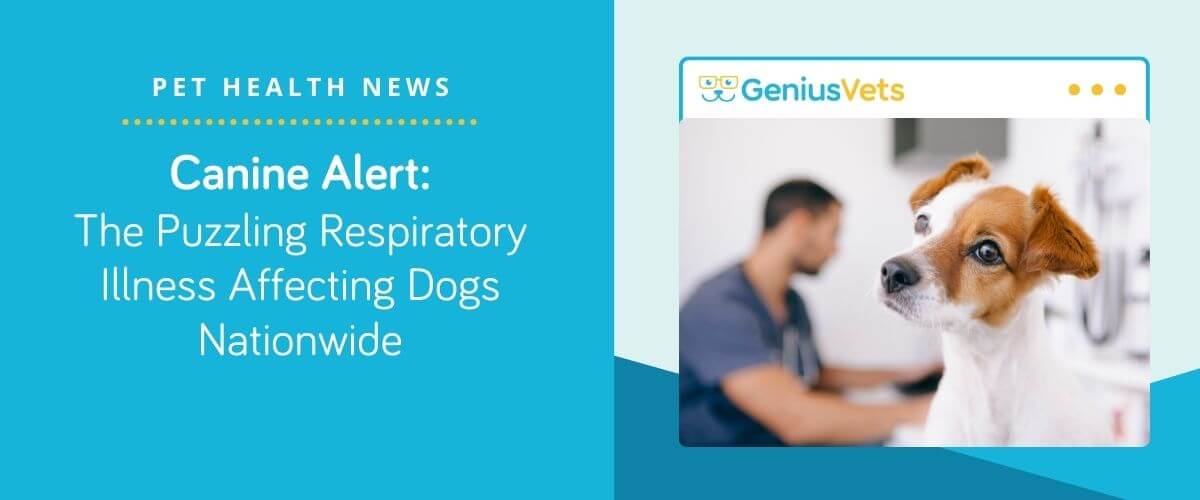In the world of canine health, a complex respiratory illness affecting dogs is unfolding before us. This sickness, making headlines both locally and nationally, has emerged as a complicated puzzle in the veterinary community. Recently, the San Diego Humane Society reported a surge in severe upper respiratory infections in dogs, attributed to a combination of bacteria - Streptococcus Zooepidemicus and Mycoplasma. Meanwhile, across various states, from Oregon to New Hampshire, there has been an alarming increase in both upper and lower respiratory system infections in dogs, with the causative agent - be it bacterial, viral, or fungal - still unidentified.
This mysterious illness, characterized primarily by a persistent cough, has led to severe complications and, in some instances, tragic fatalities in affected dogs. We aim to stay up-to-date with the latest updates and provide information in these uncertain moments for our beloved canine companions.
.png)
The Initial Symptoms: A Cough That Lingers
The illness typically presents as a cough that may last for weeks, often proving unresponsive to standard treatments like antibiotics. This resistance to treatment can escalate to severe breathing difficulties and pneumonia in affected dogs. According to Dr. Michele Drake from The Drake Center, this illness has been exclusive to dogs, showing no signs of affecting cats, humans, or other household pets. The common symptoms include coughing, nasal discharge, lethargy, and poor appetite, primarily spreading through respiratory secretions and close contact among dogs. Notably, the Drake Center observed an increase in severe respiratory infections through the spring and summer of 2023, though recent instances have been less frequent.
The Puzzling Pattern of the Illness
Dogs usually recover from respiratory illnesses within seven to ten days. However, veterinarians have noted a rise in cases where the cough persists for weeks or even months. These instances are often traced back to environments where dogs interact closely with others, such as daycares, dog parks, and grooming or boarding facilities.
The Oregon Department of Agriculture has reported over 200 cases since mid-August, though the total number of fatalities remains unclear. While contagious coughs are not uncommon in dogs, the persistence of this illness into the cooler months of fall, when cases typically decrease, is unusual.
.png)
Progression of the Illness
The illness has been shown to progress in three distinct ways:
- A mild to moderate cough lasting six to eight weeks or longer, with little to no response to antibiotics.
- Chronic pneumonia that is resistant to antibiotics.
- Severe pneumonia leading to critical outcomes within 24 to 36 hours.
Geographical Spread
Reports of this mysterious illness have emerged from various states, including Oregon, Colorado, New Hampshire, Massachusetts, Rhode Island, California, Indiana, Illinois, Washington, Idaho, Georgia, and Florida. The American Veterinary Medical Association closely monitors these cases and remains in contact with state officials.
Recognizing the Symptoms
Key symptoms of this mystery illness include:
- Persistent coughing
- Sneezing
- Nasal or eye discharge Lethargy
- Trouble breathing
- Bluish or purplish gums, indicating oxygen deprivation
Dog owners who observe these symptoms, especially after their pet has been in close contact with other dogs, should seek veterinary care immediately.
.png)
Prevention and Care
Veterinarians advise keeping dogs away from crowded dog areas to reduce the risk of contracting this illness. With the holiday season approaching and many relying on boarding services, it is recommended to seek alternative care options. Dr. Drake emphasizes the importance of keeping vaccinations up to date, including for Bordetella and canine influenza, and advises waiting two weeks post-vaccination before exposing dogs to others.
For dogs showing symptoms, immediate veterinary consultation is crucial for effective treatment and preventing the spread. Additionally, submitting a sample to a research lab may assist in further understanding and combating this mysterious illness.
If you have questions and you'd like to reach out to us, you can call us directly at (936) 856-0200, or you can email us at #. Don't forget to follow us on social media Facebook, Instagram.

